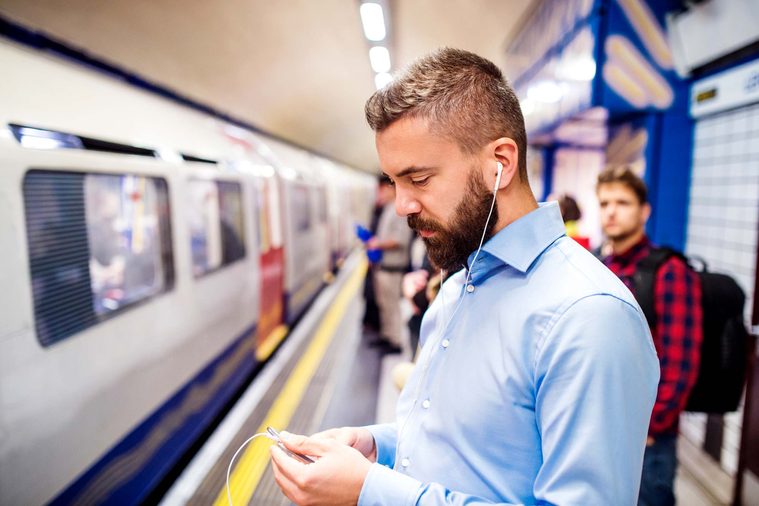
We’re a nation of commuters
Whether you travel to and from work by train, bus, car, foot, bicycle, scooter, or another means altogether, commutes are rarely fun. The average employee has a 26-minute commute (assuming everything goes according to plan, which is, of course, never). This is about 20 percent longer than when the U.S. Census Bureau first started tracking commutes in 1980. And what’s worse, your commute may be affecting your health in some surprising ways. Taking steps to lower any and all risks associated with your commute can make a big difference in how you feel as well as how you perform on the job. These are the signs that commuting is taking its toll on your well-being.

You’re getting colds more often
Straphangers, beware: Certain viruses, like norovirus and colds, can linger on surfaces such as the subway pole or even your seat for up to 24 hours, says New York City internist and pulmonologist Len Horovitz, MD. “We can assume if we touch surfaces we can get these germs on our hands and get sick,” he says. But commuters aren’t powerless. “It’s OK to get germs on your hands if you wash them or use antibacterial gel and don’t touch your face,” he warns. “Just touching something does nothing. You get sick when you introduce germs to your mouth, eyes, or nose.” Most of us touch our face several times a minute without even thinking about it, he adds. But you should still try to avoid touching your face, use hand sanitizer after touching a public service, and wash your hands as soon as you get to work. Do you live in the U.S. state with the most treacherous commute?
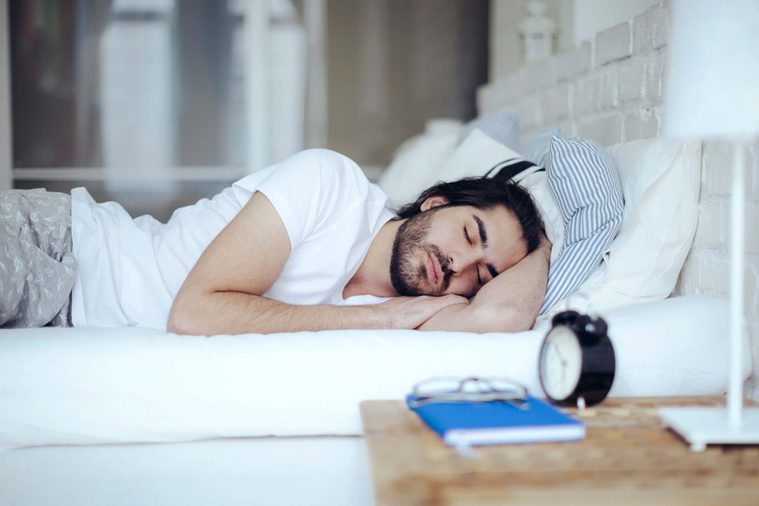
You set your alarm clock earlier and earlier
Traffic is a bear, and the 6 a.m. train is always packed to the gills. What do you do? “We end up getting up earlier and earlier to avoid commuter problems,” says Los Angeles sleep expert Michael J. Breus, PhD, author of several books on sleep including the latest The Power of When. Makes sense, but this sets us up for the serious health risks associated with sleep deprivation. “We know that it slows our reaction time, and that driving when tired or drowsy is like driving when drunk,” he says. “It also slows cognition so you won’t make decisions nearly as well as you would if you were not sleep deprived.” Not to mention, sleep loss just makes everything seem worse. “If you are anxious about getting the train, then not getting enough sleep will make you even more anxious,” Dr. Breus says. Of course, the solution is to get to bed earlier or hope your boss is understanding enough to let you come to the office a little later. Either way, “getting up at 5 a.m means your body is still producing the sleep hormone melatonin,” he says. Use a light therapy box such as the Philips Morning Wake-Up Light With Sunrise Simulation and Dusk Fading Night or the Philips Golite Blu Light in the morning to “stop the melatonin faucet in your brain,” he says. Caffeine early in the morning is also not a great idea because our body’s natural stress hormone cortisol soars in the wee hours, Dr. Breus adds. “Wait 1.5 to 2 hours to drink coffee, as coffee plus cortisol is a bad combination.”
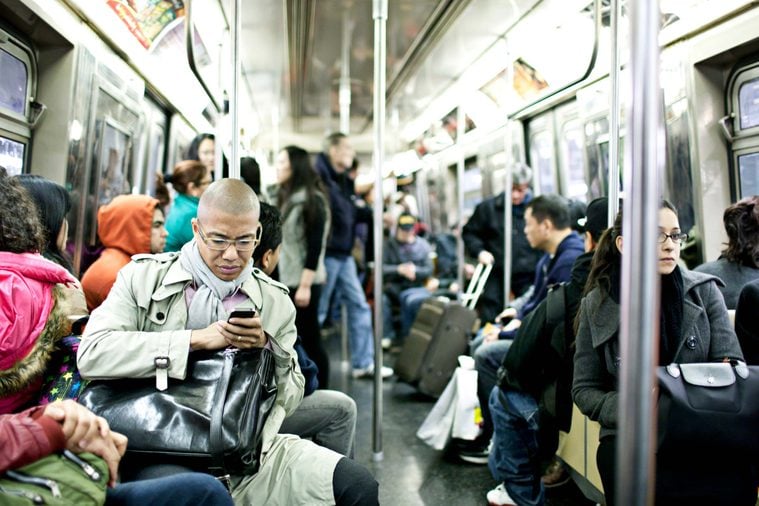
Your hand is attached to your horn
Traffic is at a standstill, and you have an 8 a.m. meeting with your supervisor. The office is 30 minutes away and it’s 7:59. Sound familiar? If so, your reaction to this commuter stress can put you at risk for heart attack. Americans spent 6.9 billion hours stuck in traffic during their rush-hour commutes in 2014, according to a report from the Texas Transportation Institute, which is part of Texas A&M University. That is 42 hours per commuter per year. Here’s what happens: “You get more and more irritated because you are going to be late, your stress hormones shoot up, your blood pressure rises, and inflammatory cytokines increase,” explains Redford B.Williams Jr., MD, Professor of Psychiatry and Behavioral Sciences at Duke University School of Medicine in Durham, North Carolina. “This contributes to the development of heart disease over time, and if you already have a heart disease, it can precipitate a heart attack,” says Dr. Williams, author several books including LifeSkills: 8 Simple Ways to Build Stronger Relationships, Communicate More Clearly and Improve Your Health and In Control.
In addition, stress may trigger behaviors harmful to your heart, such as consuming artery-clogging fatty foods, smoking, or drinking alcohol. “In these moments, you have to ask yourself if there is something that you can do to modify the situation or if you need to calm down,” Williams says. Ask yourself these four questions:
- Is this situation important to you?
- Would a reasonable person be feeling what you are feeling?
- Is it modifiable in any constructive way?
- Is it worth it to take action?
“If there are any no answers to these four questions, you need to chill, meditate, turn on the radio and say ‘there is nothing I can do so I must calm down,'” he says. This is also good advice if you develop public transportation rage when trains or buses don’t run on time.

One side of your face is aging faster than the other
“We know that if you drive, the left side of your face gets more sun damage than the right one, and that if you are a passenger, it’s your right side that’s at risk,” says Michael Gold, MD, founder and medical director of Gold Skin Care Center, Advanced Aesthetics Medical Spa, The Laser & Rejuvenation Center, and Tennessee Clinical Research Center in Nashville. “This occurs even when the glass is tinted,” he says. The result? “You will age faster on the exposed side, and the sun damage can increase risk of skin cancer and precancers.” His advice? Slather on sunscreen with an SPF of 30 or above before your commute, even in winter months. “If you are fair-skinned, we want a 50 or higher SPF.” These are the things you should never, ever leave in your car.
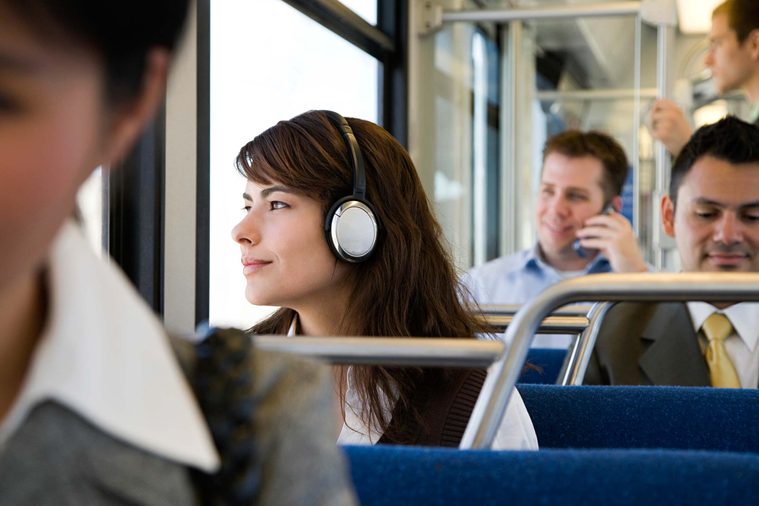
Your commute feels as long as your day
Sitting too long is a killer, literally, says Ivica Marc, a personal trainer at Exceed Physical Culture in New York City. “If you are sitting in a car, train, or bus for long periods of time every workday, you are putting yourself at risk for heart disease, diabetes, and premature death,” he says. Sitting for long periods when traveling can increase the risk for deep venous thrombosis. When a clot breaks off and moves through your bloodstream, it can get stuck in the blood vessels in the brain, lungs, heart, or another area, leading to severe damage, he says. “Get off of the train a stop or two early to get blood flowing, take a walk at lunch, or if you have a desk job, get up and walk to tell a colleague something instead of sending an e-mail,” he says. Try these little tricks to make your commute go by faster.
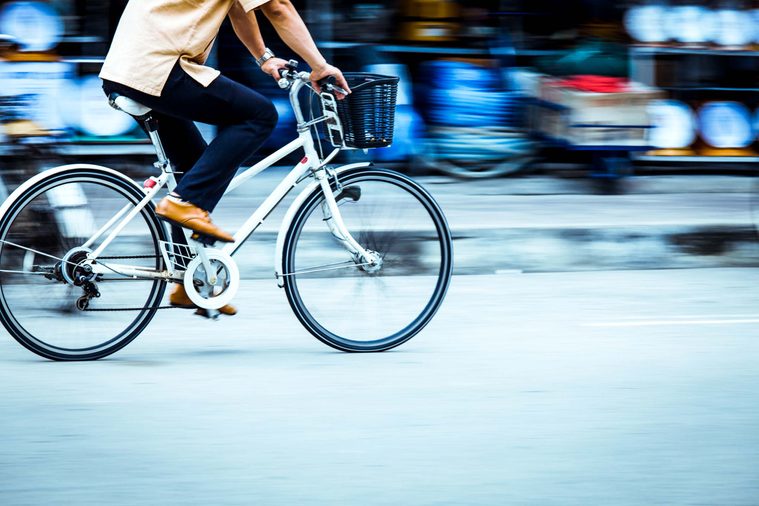
You think you are Evil Knievel on a city bike
There’s been a 64 percent increase in the number of people who cycle to and from work from 2000 to 2013, according to the National Highway Traffic Safety Administration. This can be a healthy and green way to get to and fro (and can significantly reduce stress), but it does come with its own risks. To minimize them, wear a properly fitting helmet, choose routes with less traffic and slower speeds, and follow the same rules as motorists (don’t ride against traffic or blow through red lights—even if you are running late to a big meeting). Scooters too can be risky business, and some adults are also choosing this mode of transport. “Wear proper safety gear, including a helmet and knee and elbow pads, to help prevent injuries,” the United States Consumer Product Safety Commission warns. “Ride the scooter on smooth, paved surfaces without any motor vehicle traffic and avoid streets, or surfaces with water, sand, gravel, or dirt.”
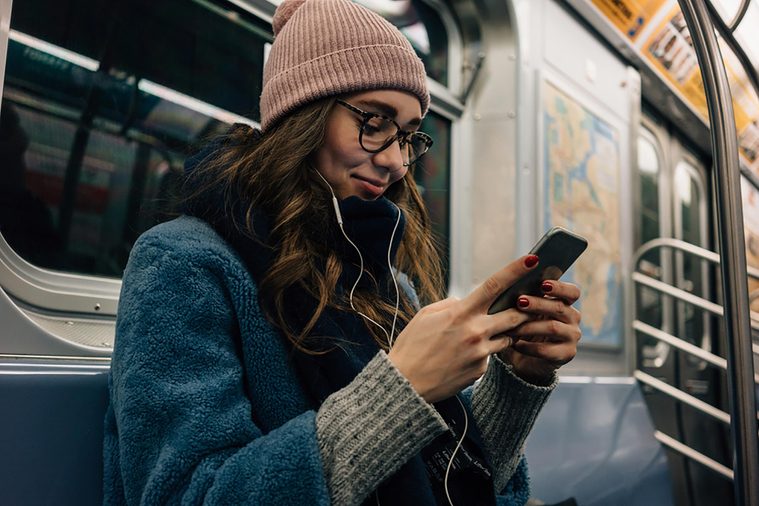
Carry a commuting survival kit
Decrease your risk of getting sick during your commute by carrying a couple of simple items around with you:
- antibacterial hand sanitizer or wipes
- sunscreen
- a relaxing playlist, podcast, or book to calm any stress (plus, podcasts can help your commute go by faster)
- a helmet, and other protective gear, if you bike or ride a scooter
Next, learn the 12 things successful people do on their commute.
